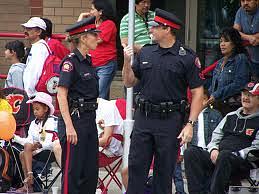Calgary boasts model police force compared to RCMP
When Shirley Heafey moved from Ottawa to Calgary to stickhandle complaints from the public about the police, she expected the worst. "Calgary was the only city in the country that I had not visited a lot... but I had heard all the stereotypical stuff about Calgary's redneck attitude so I was expecting a real challenge," says Heafey, who had been twice appointed chair and CEO of the
Instead, Heafey found a police force that she calls "progressive, transparent and accountable," especially when compared to the RCMP.
"I have total access to all files, to the whole database. Superintendents get back to me within an hour when I call. I am invited to meetings and training sessions. I wasn't prepared for this. With the RCMP I was always fighting to get files that I needed to see," she said in an interview.
Heafey works for the Calgary Police Commission, a group of civilians appointed by city council to oversee the policy and operations of the 1,900-member police force.
She's been in the job for four years and handles about 200 complaints a year. She doesn't investigate the complaints about the police brought to her attention by individual citizens; the police do that themselves. But she does audit the police investigations of the complaints, including use of excessive force, and can intervene at any point if she feels it necessary. She follows up with complainants and files a report on each case to the police commission.
She also appears on behalf of the police commission and complainants at a monthly day-long meeting of five police superintendents who review complaints that have been investigated and make recommendations to the police chief about what action needs to be taken. The head of the police union also sits in on the meeting and reports back to members.
"This sort of openness was unheard of with the RCMP," Heafey says. "The RCMP culture is such that they will do anything to protect their image. And if you get into trouble, you are on your own."
Heafey is also impressed with how the Calgary police train recruits to deal with people who have mental illnesses, or need some sort of assistance from health-care or social service agencies.
Standards such as these offer a stark contrast to RCMP training which, according to Heafey, is "inadequate" for the work they are expected to do, usually in small detachments spread across the country.
Read more?
Internet site reference:
http://www.straightgoods.ca/2011/ViewArticle.cfm?Ref=891
Comments
There are 0 comments on this post













